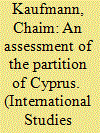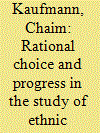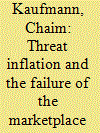| Srl | Item |
| 1 |
ID:
077537


|
|
|
|
|
| Publication |
2007.
|
| Summary/Abstract |
This paper proposes a standard for evaluation of possible solutions to communal conflicts, including partition, based on protection of human life. A partition should be judged successful only if it costs fewer lives than the expected loss of life under any alternative. Solutions to communal conflicts should also be stable over long periods, eliminating or drastically reducing fears of people in the affected communities that they could become victims of renewed violence. An assessment of the 1974 partition of Cyprus is presented, which finds that its net impact on human life remains uncertain-principally because the partition occurred so quickly after the July 1974 coup by Greek Cypriot ultra-nationalists that was the main source of fear of very large-scale ethnic cleansing that we cannot know what the new government might have done. What we can confidently say is that, absent partition, deadly communal violence in Cyprus would have continued to recur and that there are grounds, including the behavior of the July coup regime, for guessing that the ultimate cost would more likely have been higher rather than lower than that of partition. Partition has also enforced peace on Cyprus for 32 years, which may have contributed to the improved climate, compared with 30 or 10 years ago, for eventual reunification
|
|
|
|
|
|
|
|
|
|
|
|
|
|
|
|
| 2 |
ID:
069873


|
|
|
|
|
| Publication |
2005.
|
| Summary/Abstract |
Through an analysis of eight recent books and a number of articles and papers, this article evaluates recent progress in the study of ethnic conflict, including large scale conflicts and episodic riots. Four main approaches have been applied to the study of ethnic conflict: rational choice, constructivism, essentialism, and structuralism (or realism). This evaluation of recent work includes that rational choice has been the least successful of the approaches; its focus on individuals' pursuit of (mainly) material benefits makes it difficult to recognize or to admit the explanatory power of nationalist feelings that do not depend on the prospect of material benefits. Constructivism has been the most influential approach over the past few decades but until recently has suffered from methodological weaknesses that have hindered testing. Essentialism has been out favor for as long as constructivism has been in, but recent methodological improvements have produced strong work that has resurrected this approach. Structuralism is the youngest approach; it is still immature but has already yielded important new insights. Some eclectic approaches are emerging that combine strengths of the latter three approaches; it remains to be seen whether comparable eclecticism will combine rational choice with one or more of the others
|
|
|
|
|
|
|
|
|
|
|
|
|
|
|
|
| 3 |
ID:
053518


|
|
|